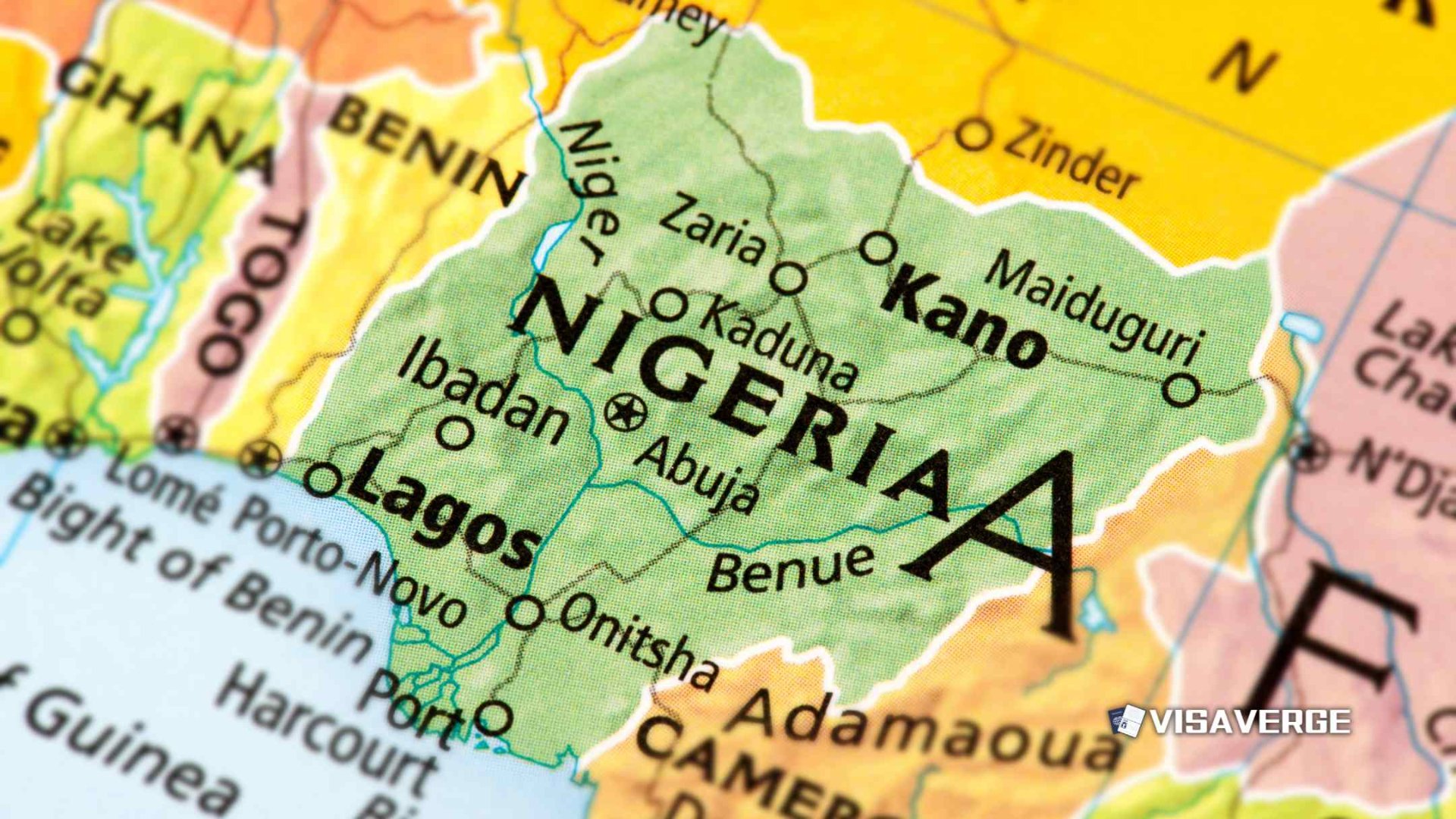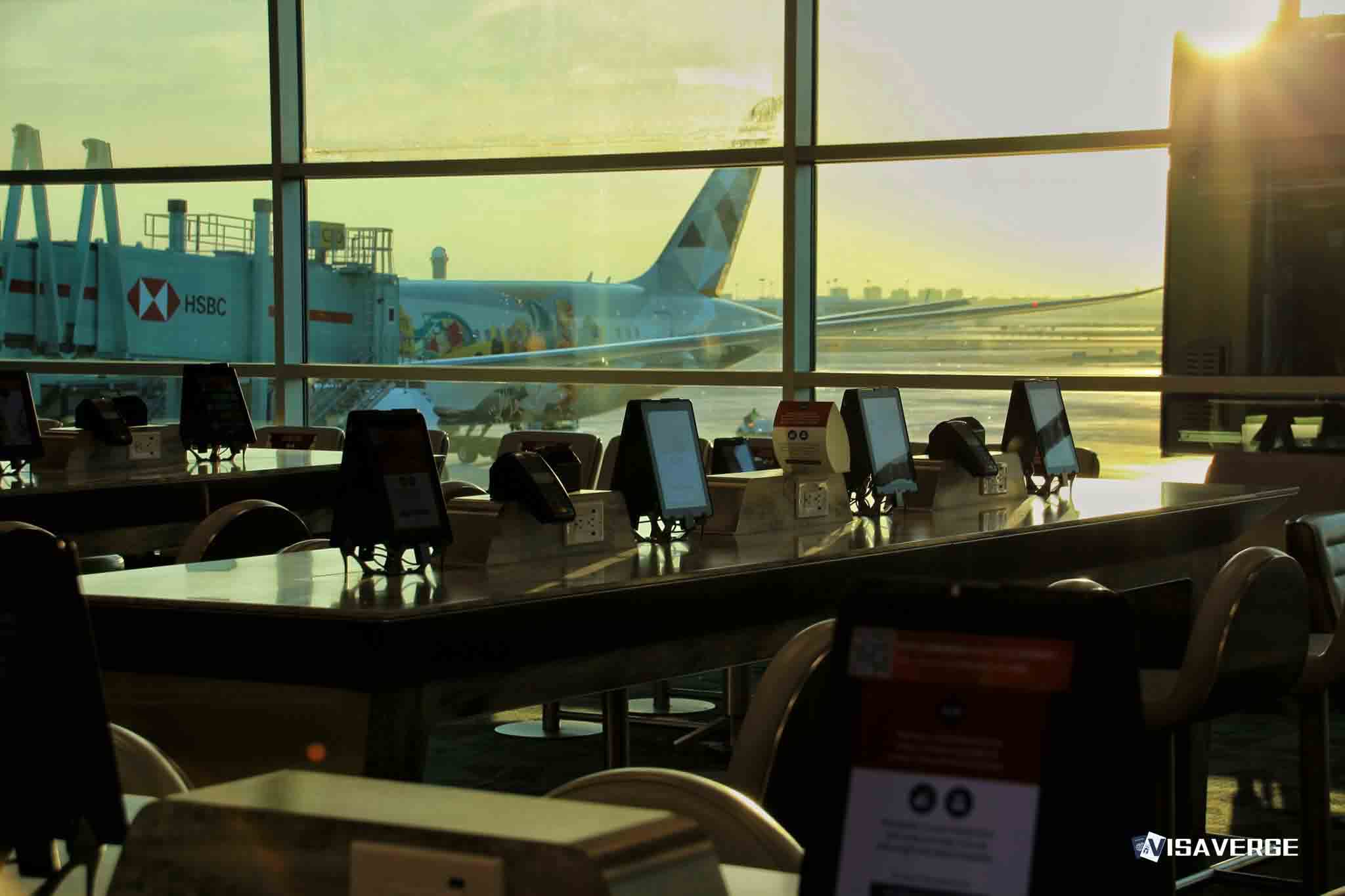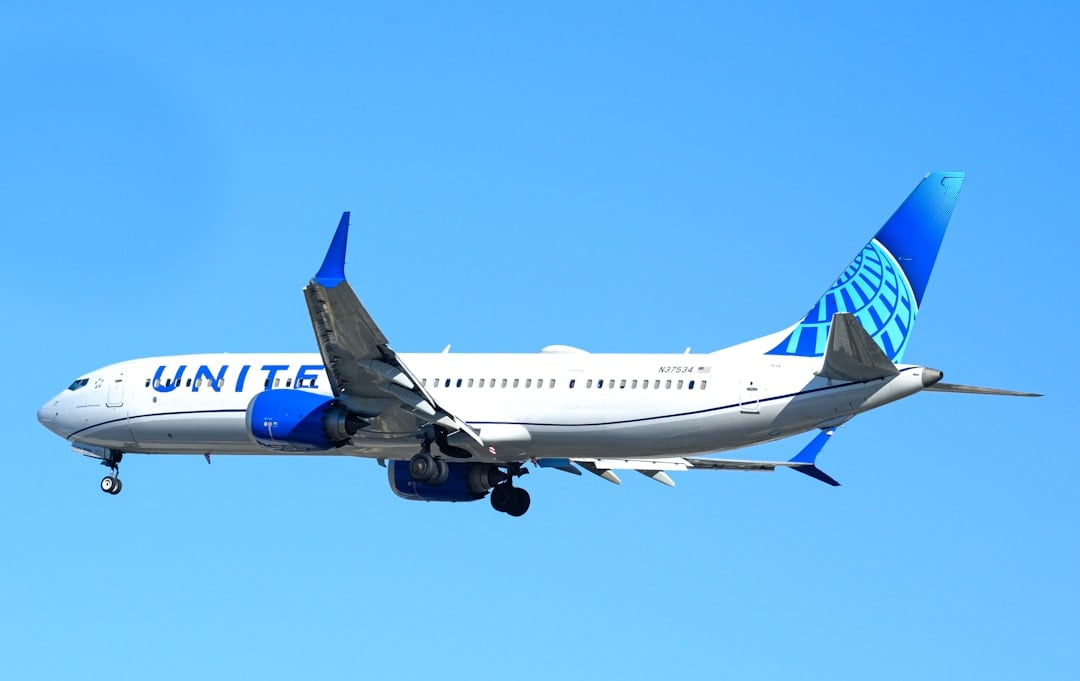Key Takeaways
• From July 8, 2025, U.S. limits most Nigerian visas to single-entry, valid for three months only.
• U.S. denies visa changes relate to Nigeria’s BRICS ties or deportation refusals, citing technical updates.
• Nigeria disputes U.S. reciprocity claims, warns new rules may damage cultural, educational, and business ties.
On July 8, 2025, the United States 🇺🇸 announced a major change to its visa policy for Nigeria, reducing most nonimmigrant visas to single-entry with a three-month validity. Just days later, the U.S. Embassy in Nigeria publicly denied that this move was linked to Nigeria’s growing involvement with BRICS or its refusal to accept deported illegal migrants, including Venezuelans. This official statement aimed to address rising speculation and diplomatic tension between the two countries.
What Changed and Why?

The new U.S. visa policy means that most Nigerians seeking to visit the United States 🇺🇸 for business, tourism, or study will now receive a visa that allows only one entry and is valid for just three months. Before this change, many Nigerians could get visas that allowed multiple entries over several years. The U.S. government says this change is not a punishment or a political message. Instead, officials describe it as part of a worldwide review and technical update of visa policies.
According to the U.S. Department of State, the main reasons for this change include:
- Global technical realignment: The U.S. is updating visa rules for many countries to make sure everyone meets the same security and technical standards.
- Reciprocity: The U.S. says it is matching Nigeria’s visa policy, which currently offers American citizens a single-entry visa valid for three months.
- Security and document standards: The U.S. wants all countries to use secure travel documents, manage visa overstays, and share security information.
A spokesperson for the U.S. Embassy in Nigeria explained, “This is a routine, worldwide process. We are working with Nigerian officials to help them meet updated standards, and we hope to continue our strong partnership.”
Nigeria’s Response and Disagreement
Nigeria’s government, however, strongly disagrees with the U.S. explanation. Ambassador Yusuf Tuggar, Nigeria’s Foreign Minister, says that Nigeria still offers five-year, multiple-entry visas to Americans, and that the new three-month e-visa is just an extra option, not a replacement. He argues that the U.S. is not being fair or truly reciprocal.
Tuggar also suggests that the U.S. may be using the new visa policy and recent tariffs on Nigerian goods to pressure Nigeria into accepting deported Venezuelans, some of whom have criminal records. He calls the new U.S. visa restrictions “disproportionate” and warns that they could hurt cultural, educational, and business exchanges between the two countries.
BRICS and Geopolitical Tensions
Some Nigerian officials and commentators believe the U.S. visa policy and new tariffs are connected to Nigeria’s growing ties with BRICS—a group of major emerging economies that includes Brazil, Russia, India, China, and South Africa. Nigeria has recently shown interest in joining BRICS, which some see as a challenge to U.S. influence.
The U.S. government, however, firmly denies any connection between its visa policy and Nigeria’s BRICS engagement. A statement from the U.S. Embassy in Nigeria reads, “The visa policy is not influenced by Nigeria’s BRICS affiliation or its stance on third-country deportees. This is about technical standards and reciprocity, not politics.”
How the New Visa Policy Affects Nigerians
The most immediate impact is on Nigerian travelers to the United States 🇺🇸. Here’s what has changed:
- Single-entry, three-month visas: Most nonimmigrant visas (for tourism, business, or study) are now valid for only one entry and three months.
- No change for existing visas: Visas issued before July 8, 2025, remain valid under their original terms.
- Stricter enforcement: The U.S. warns that overstaying a visa can lead to permanent bans and even prosecution.
- Fewer opportunities: The new policy may make it harder for Nigerians to travel for business, education, or family visits, especially for those who need to make multiple trips.
Nigerian officials have urged the U.S. to reconsider, saying the new rules could damage important ties between the two countries.
Broader U.S. Visa Policy Trends in 2025
Nigeria is not the only country affected by recent U.S. visa policy changes. In 2025, the U.S. also:
- Imposed similar single-entry, three-month visa limits on Ethiopia and Cameroon.
- Suspended all visa services for Eritrea, Somalia, and Sudan.
- Introduced tougher screening measures, including checks on social media accounts for foreign applicants.
These moves are part of what the U.S. calls a “reciprocity realignment,” meaning the U.S. is adjusting its visa rules to match what other countries offer to Americans.
Why Is Reciprocity Important?
Reciprocity means treating people from other countries the same way they treat Americans. If Nigeria gives Americans only a single-entry visa for three months, the U.S. will do the same for Nigerians. The U.S. says this is fair and encourages countries to offer better visa terms to Americans.
However, Nigeria’s Foreign Minister says the U.S. is not being accurate about Nigeria’s visa policy. He insists that Americans can still get five-year, multiple-entry visas to Nigeria, and that the three-month e-visa is just an extra option.
Concerns About Visa Overstays
One reason the U.S. may be tightening its visa policy is concern about Nigerians overstaying their visas. U.S. immigration authorities have long said that some Nigerian visitors do not leave the country when their visas expire. This is a problem for the U.S., which wants to make sure visitors follow the rules.
According to analysis by VisaVerge.com, visa overstays by Nigerian nationals have been a concern for U.S. officials for several years. This may have played a role in the decision to shorten visa validity and limit entries.
What Does This Mean for Business, Education, and Families?
The new visa policy could have real effects on people’s lives:
- Business travelers: Nigerian businesspeople who need to visit the U.S. multiple times in a year will now have to apply for a new visa each time, adding cost and paperwork.
- Students: Nigerian students who want to travel home during school breaks may face challenges returning to the U.S. if their visas expire.
- Families: Nigerians with family in the U.S. may find it harder to visit for important events or emergencies.
Nigerian officials warn that these restrictions could slow down trade, investment, and cultural exchange between the two countries.
What About Nigerians Already in the U.S.?
If you are a Nigerian citizen who received a U.S. visa before July 8, 2025, your visa remains valid under the original terms. You do not need to worry about the new rules until you apply for a new visa.
However, if you overstay your visa, you could face serious consequences, including:
- Permanent bans: You may be barred from entering the U.S. in the future.
- Prosecution: In some cases, overstaying can lead to legal action.
It’s important to follow all visa rules and leave the U.S. before your visa expires.
How to Apply for a U.S. Visa as a Nigerian (July 2025 and After)
If you plan to visit the United States 🇺🇸 from Nigeria, here’s what you need to know:
- Most nonimmigrant visas are now single-entry, valid for three months.
- Visas issued before July 8, 2025, keep their original validity.
- Make sure all your documents are accurate and up to date.
- Be prepared for stricter screening, including possible checks on your social media.
- Do not overstay your visa.
For the latest information and to start your application, visit the U.S. Embassy in Nigeria’s official visa page.
What Is BRICS and Why Does It Matter?
BRICS is a group of five major emerging economies: Brazil, Russia, India, China, and South Africa. In recent years, Nigeria has shown interest in joining BRICS, which some see as a way to build stronger ties with countries outside the traditional Western powers.
Some Nigerian officials and experts believe that the U.S. is using visa policy and tariffs to discourage Nigeria from getting closer to BRICS. However, the U.S. government strongly denies this, saying its visa policy is not influenced by Nigeria’s BRICS engagement.
Diplomatic Engagement and the Path Forward
Both the United States 🇺🇸 and Nigeria have said they will keep talking to try to resolve the issue. The U.S. says it is ready to help Nigeria improve its visa systems and meet international security standards. Nigerian officials hope to convince the U.S. to restore the previous, more generous visa terms.
So far, there is no sign that the U.S. will reverse the new policy soon. But ongoing talks and technical cooperation could lead to changes in the future.
What Should Nigerian Travelers Do Now?
If you are planning to travel to the United States 🇺🇸 from Nigeria:
- Check the latest visa rules: Visit the U.S. Embassy website for updates.
- Apply early: The process may take longer due to new screening measures.
- Prepare for single-entry, three-month visas: Plan your trip carefully.
- Do not overstay: Leaving the U.S. before your visa expires is very important.
- Keep records: Save copies of your visa, travel documents, and any communication with U.S. officials.
Official Resources
- For U.S. visa information and updates, visit the U.S. Embassy in Nigeria’s official website.
- For Nigerian government statements and visa policy details, check the Nigerian Ministry of Foreign Affairs’ official channels.
Looking Ahead: What Could Change?
While the current visa policy is strict, both countries have said they want to keep working together. The U.S. continues to encourage Nigeria to upgrade its visa systems and meet international security standards. Nigerian officials are pushing for a return to more flexible visa options.
If Nigeria changes its visa policy for Americans, or if both countries agree on new security measures, the U.S. could reconsider its rules for Nigerian travelers. For now, though, the single-entry, three-month visa is the standard.
Key Takeaways for Nigerians and Stakeholders
- Most U.S. nonimmigrant visas for Nigerians are now single-entry, valid for three months.
- The U.S. says this is about technical standards and reciprocity, not politics or BRICS.
- Nigeria disagrees, calling the policy disproportionate and warning of negative effects.
- Both countries are still talking, but no quick change is expected.
- Travelers should follow all visa rules and check official sources for updates.
As the situation develops, staying informed and following official guidance will help Nigerian travelers, students, and businesspeople manage the new visa policy. For more analysis and updates on global visa policy trends, VisaVerge.com reports that ongoing diplomatic efforts may eventually lead to changes, but for now, careful planning and compliance are essential for anyone affected by the new rules.
Learn Today
Nonimmigrant Visa → A visa allowing temporary entry to the U.S. for tourism, business, or study purposes.
Reciprocity → A principle where visa rules are matched between countries based on mutual treatment.
Visa Overstay → The act of remaining in the U.S. beyond the authorized visa period, risking penalties.
BRICS → An economic group of Brazil, Russia, India, China, and South Africa with emerging global influence.
Single-entry Visa → A visa permitting only one entry into the U.S. during its validity period.
This Article in a Nutshell
On July 8, 2025, the U.S. introduced single-entry, three-month visas for Nigerians amid official denials linking this to BRICS or deportation issues. Nigeria rejects this explanation, stressing the impact on travel and bilateral relations. Dialogue continues as both nations weigh technical standards and political concerns.
— By VisaVerge.com







